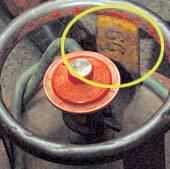 |
| The stay where a gas cylinder expiry date is painted. Picture by Bishwarup Dutta |
Do you know liquefied petroleum gas (LPG) cylinders have an expiry date? Chances are you don’t. And neither do most LPG dealers in Calcutta, despite the fact that cylinders used beyond the expiry date can leak, causing a catastrophe.
According to experts, LPG cylinders have a life span of 20 to 25 years but should be checked every five years. Alok Singh, in-charge (corporate communications), Indian Oil Corporation (IOC), said: “The quarter of a year when the next check is due is the expiry date of the cylinder. The quarter is painted on one of the three ‘vertical stays’ on which the rim rests. The date is on the side of a ‘stay’ facing the regulator.
“If D-06 is painted on your cylinder, it means it has expired in the last quarter of 2006. A, B and C stand for the first, second and third quarters of a year,” explained Singh. Regular checks are done at the filling units, he claimed.
Metro visited a home, a booking office and a godown to find out the importance given to LPG cylinder expiry dates.
Stop 1: Aparna Chatterjee, a teacher, did not know that LPG cylinders had expiry dates. On learning that her cylinder had expired long back, the south Calcutta resident is determined to get it replaced.
Stop 2: Nilmoni Mondol, the senior assistant at Calcutta Wholesale Consumers’ Cooperative Society, on Chittaranjan Avenue, said: “LPG cylinders don’t have an expiry date. All one must do when the cylinder arrives is check the seal and connect it to the burner to find out if it works.” When Metro pointed out that the cylinder in the booking office bore an expiry date of D-99 (see picture), he promised to “certainly look into it”.
Stop 3: It was no different at a godown on the premises of an Entally nursing home. Most cylinders that Metro checked were past the expiry date. The guard supervising the loading of cylinders in cycle vans after scrutinising the slips issued by the booking office had never heard of the expiry dates.
An official of a market leader in the cooking gas segment said: “Some cylinders in homes and restaurants can be more than a year past their expiry dates because they have been with customers or in godowns for long. The cylinders can’t be rechecked unless they come back to the plant.” The check mainly involves a pressure test, after which it is okayed for a new five-year period.
The official added that petroleum ministry teams visit each plant to look into safety measures. There are also internal checks.










